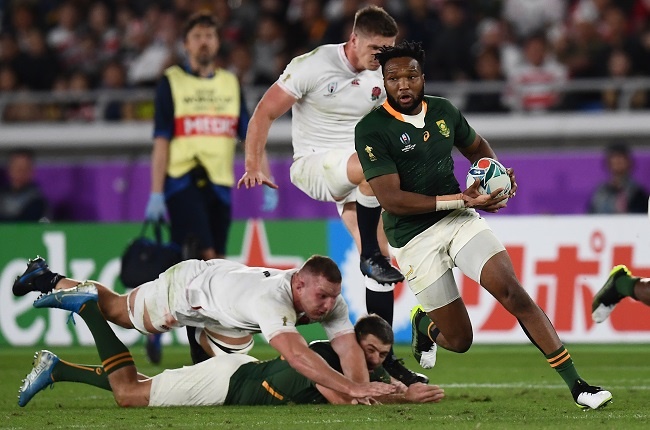


South Africas centre Lukhanyo Am (R) runs with the ball during the Japan 2019 Rugby World Cup final match between England and South Africa at the International Stadium Yokohama in Yokohama on November 2, 2019. (Photo by CHARLY TRIBALLEAU / AFP)
- A weekend report has shone a light on the intriguing possibility of Lukhanyo Am becoming a future Springbok captain.
- SA sport is currently grappling with the broader implications of the Black Lives Matter debate.
- Am’s increasing presence in local rugby and the respect he commands make him a suitable candidate to be a national leader.
Lukhanyo Am, Springbok captain.
This past weekend, Rapport mooted this intriguing possibility – with the obvious caveat that he’ll be handed the role should Siya Kolisi, the incumbent, become injured or lose form.
The article has, understandably, elicited less attention than it would’ve at a slightly different time.
Firstly, the Black Lives Matter (BLM) movement has shifted the focus from the mere structural shortcomings of local sport’s transformation efforts to a broader acknowledgement that so many South Africans’ lives (including Kolisi’s previously) simply don’t count for anything.
And then Kaunda Ntunja’s tragic passing on Monday provided us with a timely, valuable reminder that being the “planned” (dare one say hypothetical?) anointed successor to Kolisi really means little in the greater scheme of things.
However, Am’s increasing prominence in South African rugby is something that shouldn’t be neglected.
BLM has and will continue to expose the festering wound of racism and inequality.
Only by gazing into an injury that has been repeatedly inflicted for centuries, and realising its true extent, can one belatedly attempt to treat it.
But as we grit our teeth during the often painful process of admitting ignorance, preconceptions and prejudice, we also need to acknowledge black excellence.
Regardless of whether those instances currently feel sporadic or not, black excellence provides us with a platform to kick on with forging a better future.
The triumph of the 27-year-old midfielder’s rise is in its steadiness. There has been nothing meteoric about it.
Since breaking into the Sharks’ 2017 squad, Am has focused on the simple goal of getting better every year.
He’s become the invisible, stabilising hand of the backlines he’s part of.
When many gasp over the fabulous try-scoring feats of the Aphiwe Dyantyis and Makazole Mapimpis, New Zealand television pundits point out how Am was the embodiment of the Springboks’ imposing, enthralling defensive system.
He had taken it upon himself to be the organiser on defence; the on-field brains, so to speak.
It is he who makes the carries that go unnoticed.
He’s the cleaner with a nifty ability to poach a ball or to make the brilliant no-look pass that leads to the opening try of a World Cup final.
More thrillingly, Am is that guy who’ll waltz through a screaming gap for a match-winning try at Newlands that leaves everyone asking: “Where did that come from?”
This year, Am has been installed as the Sharks’ captain in a leadership structure based on also empowering other leaders in specialist areas. Mapimpi leads the transitions from defence to attack, Thomas du Toit is set-piece skipper and Curwin Bosch the attacking mastermind.
But they also need a man willing to be at the forefront; the man who will bring it all together through his ability to, simply put, never really have a poor game.
Given how the King William’s Town favourite has revelled in King’s Park’s inclusive setup, you’d expect him to seamlessly do it at international level too.
Am is commanding immense, newfound respect in the local game.
South Africa needs to apply his example to the broader fight for consensus and equality.

